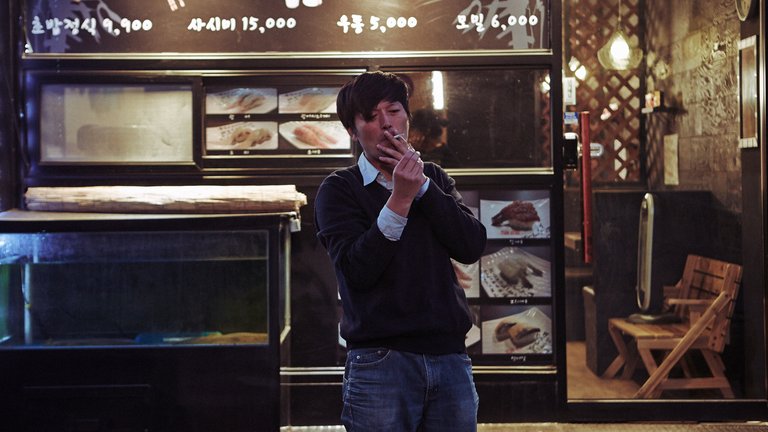
Both written and directed by the famous Hong Sangsoo, 'Right Now, Wrong Then' takes low budget filmmaking to an emotional height regarding human interaction and the power of words, using simplicity in all ways other than screenplay to promote two individual ways in which a scenario may go down for two people.
With a two hour runtime, the film is effectively split into two, following the same interaction of two characters: an arthouse director meets a small artist, and the two spend the day together conversing with drinks and food. With this, the camera movement and locations are as minimal and average as you'd expect: a confined space in a sushi restuarant with the camera static in a corner just observing the two characters.
That isn't to say it is bad, in fact, I found it really motivating to see such little regard for camera movements, given the few that do take place are emphasised based on a character's emotions during a particular discussion, which is entirely the point of the film. A character may use the wrong wording or say something a bit sensitive, and the camera will slowly zoom in on the character's face to heighten their perspective of the other in that moment. It even promotes the effectiveness of human interaction and body language, rather than focusing on perfect lighting and wide shots on fancy anamorphic lenses.
There just isn't any need for it in Right Now, Wrong Then. And it works in its favour by placing these everyday topics and locations in the forefront. Though some may be put-off by the seemingly dull narrative and writing. This isn't a film made to wow you, but to make you think about the fragility and importance of wording. The film shows the exact same scenario twice: one ending negatively, and the other ending on a more positive note. The locations, interactions, all pretty much the same.
I found myself falling in love with the characters and their very much grounded connections. It was refreshing to see a narrative that focuses on romance in a realistic manner, rather than glorifying the characters or following some traditional romantic stereotype. It's evident in the two parts that both characters are quite flawed people with their own insecurities, and the contrast between struggling artist and successful arthouse director displays that excellently alongside their discussions over coffee, when drunk, or even invited to a social gathering in the night.
Hong Sangsoo writes the characters with such excellence, followed by two incredible performances, that it doesn't feel like you're watching a work of fiction at all. You almost feel as if you're overlooking and hearing the interactions of two people in public. And for pulling it off with a small budget and not appearing cheap, it's an instant favourite for me. If you're into filmmaking or arthouse cinema yourself, check it out.